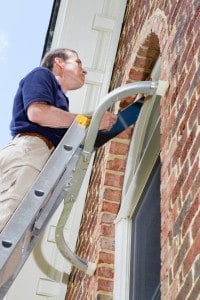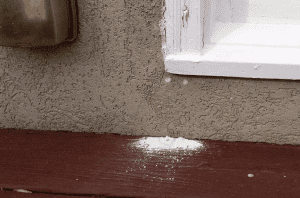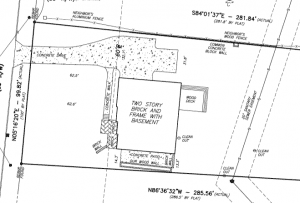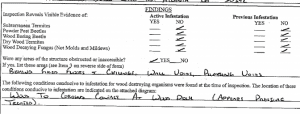Congrats!!! You are UNDER CONTRACT!
The first step is to get those inspections scheduled as soon as possible.
The best inspectors are going to be busy. During busy times, it may take up to a week to get people onsite to do the inspections. Then, depending on what they find, contractors may be needed to estimate repairs. Get ready – There will be a flurry of appointments and information flying around during the first week after your offer is accepted.
Some buyers have a specific home inspector that they want to use. Most of the time, however, our clients rely on us for a referral. Our only goal is to get a thorough inspection for you so that you do not inherit an issue that could have been discovered. Our mission going into the home inspection process is two-fold: 1. Make sure we have 2-3 proven, really thorough home inspectors to choose from and 2. Make sure we can get one of them on site quickly so we have as much time as possible within the Due Diligence Period to work through the findings.
Below is a list of common inspections Atlanta area buyers choose to conduct:
General Home Inspection
The general home inspection looks at both the exterior and interior of the home. On the exterior, the inspector is primarily looking for signs of drainage and structural issues. Unless a home has been painted recently, there are almost always spots of weather damaged wood trim. They also look for proper flashing and connections for decks.
On the interior, the inspector is checking things like the appliances, plumbing fixtures, the electrical panel, the HVAC system appearance and function, the age of the equipment, doorways for latching and settlement, ceilings for water leaks, floors for sloping, smells of dampness and attics for roof leaks.
Most home inspectors work off of a checklist and take photos of any items of concern.
Stucco Inspection
Stucco Inspectors are looking for moisture intrusion and signs of moisture intrusion. The most frequent locations for testing are at junctions of dissimilar materials, windows and doors. The photo to the left shows invasive testing at a suspect location by drilling two holes in the stucco. This is done so that the area behind can be assessed by inserting a two-pronged moisture probe. The holes are then caulked and color-matched as much as possible.
Radon Inspection
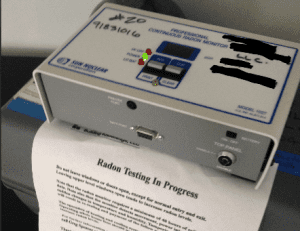 Radon is an odorless, colorless cancer-causing gas. Typically, the testing equipment is about the size of a cable box and is placed on the lowest living floor of the residence. Could be the basement – could be the master bedroom. If this test is being performed in your house, it may take up to 48 hours and the equipment should not be disturbed. There should also be warnings posted about not opening windows and doors other than to come and go during normal life. The testing device is measuring radon concentrations in the air so they do not want sneaky people trying to artificially dilute the test results.
Radon is an odorless, colorless cancer-causing gas. Typically, the testing equipment is about the size of a cable box and is placed on the lowest living floor of the residence. Could be the basement – could be the master bedroom. If this test is being performed in your house, it may take up to 48 hours and the equipment should not be disturbed. There should also be warnings posted about not opening windows and doors other than to come and go during normal life. The testing device is measuring radon concentrations in the air so they do not want sneaky people trying to artificially dilute the test results.
If remediation is required, the cost usually ranges $2000 – $2500.
Property Survey
A property survey provides a couple of primary things: 1) It shows all of the improvements on the property in relation to the property lines so you can see if there are any encroachments and recorded easements. 2) It also results in flagging out in the field on the property corners so they can be easily seen for you as the buyer and your new neighbors.
Some attorneys have suggested that a property survey is more crucial than a home inspection because it could reveal that the house is not fully on the property. You can fix most things with a house but it is not likely going to be feasible to move it if it was built in the wrong place.
Termite Inspection
Statistics for Georgia indicate that there are 10-12 colonies of subterranean termites per acre. That means inspecting for termites is standard practice. General Home inspectors typically only note evidence of they observe it during their normal inspection. If you want a certified report, you will need to hire a licensed pest control company to do a separate termite inspection. Fees typically range from $50 to $150 for this.
Septic Inspection
If you are considering a home that is served by a septic tank, you need to take some additional steps to make sure you check it out. Tanks can fill up, settlement can disconnect the pipes from the tank, drain field lines can clog. Ask the seller for the maintenance records and at least have the tank pumped out prior to purchasing the home.
If you are a larger family buying a home from a single person or couple, you really need to be careful due to the new load the extra people will put on the system. Our advice: Consult a professional company and proceed with caution. You can also look for manholes in the street out in front of the house. If they are there and not too far uphill from the house, you may have the option to connect to public sewer at some point in the future.
Well Inspection
Very few homes are still served by a well. If the house you are considering is, it will likely require additional maintenance to treat the water, run the pump and make sure there is adequate flow. Consult an expert!
Swimming Pool Inspection
Swimming pool inspections are mostly focused on the pool decking and surface integrity along with the pumping equipment. Most pool maintenance companies can perform these inspections and you should expect to pay $100-$200 for an assessment of the pool’s condition.
Other Issues that could be prompted by the General Home Inspection:
- Mold Remediation
- Water Intrusion
- Pest Intrusion
- Roof / Hail Damage
- HVAC Service
- Asbestos Abatement
- Lead-Paint Abatement
Objectivity
We want as much objectivity in this process as possible so we go to great lengths to make sure it does not feel like we need good results from any of our inspections. Ultimately our livelihood depends on our ability to serve our clients best interests. Buyers choose houses that best suit their needs after sifting through the inventory of available homes. We don’t ever want to rush that process. Once the choice is made though, our hope is that the house they chose does not have serious unforeseen problems. We purposefully do not attend home inspections so there is no chance for us to “influence” the process one way or the other. We have found that our thoughts are best offered as we process through the inspection results after the fact. Many times, we end up deferring to a contractor or third-party expert for a second opinion anyway.
Who Attends the Home Inspection
Typically just the Buyer and the Home Inspector are on site for the inspection. The Seller should not be there to allow for open and honest conversations between the inspector and the buyer. I used to be a registered professional civil engineer. I also have over 20 years of experience so it is hard for me not to talk to the home inspectors while they are working. Best case, I may just slow the process down which could increase the cost of the inspection. Worst case, I may interject an opinion during the inspection that differs from your inspector and you lose objectivity. In fact, there are a couple of inspectors in the Atlanta market place seem to take great pride in being harsh by “educating” agents and buyers about defects as they perform their inspections.
As long as we get timely, thorough and accurate results we do not care who the inspector is. Experience has also taught us that things go smoother and more efficiently when we let the inspectors do their job – they way they like to do it.
How Long does a Home Inspection take?
The time varies by the size of the structure AND how much is wrong with it. For condos, we expect it to take a couple of hours. For a 3000-4000 sq. ft. house, the home inspection may take around 4 hours. Home inspections for houses that are 7000 – 10,000 sq. ft. will probably take all day.
The End Goal
We are only going to make offers on homes our client does not like. We want the deals to work. Home Inspectors are paid to find things, generate reports and state concerns. We then help our clients investigate some or all of those concerns and get contractor estimates to address those concerns. People have different tolerances for issues. Experts disagree. Our goal is to help our buyers get enough information so that they can then decide what they want to do. There are lots of negotiating techniques that can be used. Our philosophy is to be very factual with the issues and credible with our contractor estimates so that the problems will be accepted as valid by the Seller.
Ultimately the end goal is to make the seller believe that they will have to address the issues regardless. By using the “Velvet Hammer” approach, the hope is that they see that addressing the issues for our client is the most expedient solution that allows them to move forward with their plans.
